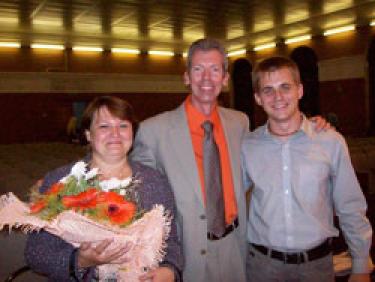The behind-the-scenes work for a production is never easy, even under ideal circumstances. Imagine, then, preparing for an American musical set in New York, to be produced in Russia and to be directed, choreographed and costumed by artists from Colorado.
Things quickly become complicated. This tremendous task was recently undertaken by Bud Coleman, chair of the University of Colorado Department of Theatre & Dance. In a great artistic and diplomatic effort, Coleman and Colorado Shakespeare Festival costumer Claire Henkel spent September 2008 in Vladivostock, Russia, working with students of the Fine Arts Academy of Far Eastern State University. The experience was rewarding not only for the students but for these two Boulderites as well.
Funded partially by a Cultural Envoy grant from the U.S. State Department, work for this project began an entire year before the trip itself took place. Former CU Chancellor Bud Peterson and Far Eastern State Rector Igor I. Zaslavsky signed a memorandum of understanding stating that both institutions “are mutually interested in furthering collaboration on academic activities.”
This catalyst allowed Coleman to travel to Vladivostock in May 2008 to begin auditioning for the chosen production, Stephen Sondheim’s “Company.”

CU Theatre and Dance Chair Bud Coleman, center, shares a warm moment with members of the Fine Arts Academy at Far Eastern State University in Russia. Coleman collaborated with his Russian colleagues to produce an American musical, set in New York, but performed in Russian.
The academy focuses on spoken-word drama, but the students also receive dance and vocal training. To create a production relatable to the Russian audience, the dialogue was performed in Russian while the song lyrics were kept in English, the original language. The U.S. consulate in Vladivostock provided translators for Coleman, which made things easier.
The production timetable added another challenge. The Fine Arts Academy began its term on Sept. 8, with the first performance planned for Sept. 23. They began rehearsal on Sept. 1, just three weeks before opening night.
The professors of the academy released the actors from class for the first week of the semester, so rehearsals went for eight hours a day, six days a week. Coleman laughed as he recalled a common Russian phrase used during that week; in English, it translated to “squeezed lemon.”
The actors’ hard work was rewarded as the process culminated in a four-performance run to enthusiastic audiences Sept. 23-28. The faculty at the Academy were so pleased with the production that it was performed again Feb. 21-22 this year.
The collaboration involved in such a grand-scale effort is astounding. Funding for this venture came from CU, the U.S. State Department, the Maxim Gorky Theater (across the street from the Academy), the Academy of Fine Arts, the U.S. consulate of Vladivostock and the Colorado Shakespeare Festival. The responses of the Russian audience proved once again the language of art in multi-cultural exchanges is universal.
Marcus Turner assists with public relations for the CU Department of Theatre and Dance:http://www.colorado.edu/TheatreDance/



